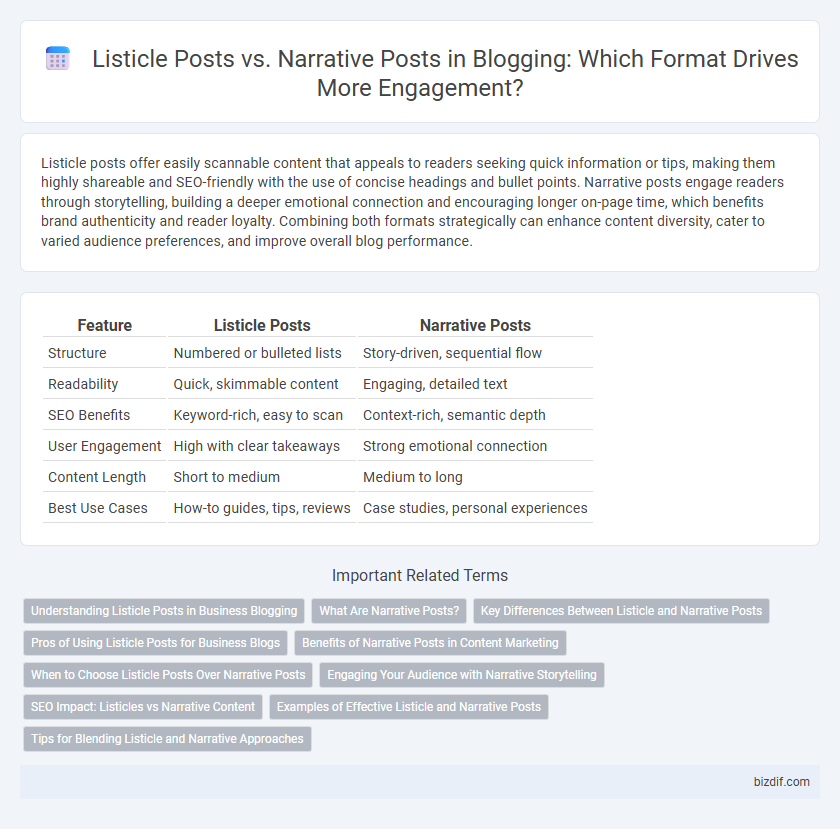Listicle posts offer easily scannable content that appeals to readers seeking quick information or tips, making them highly shareable and SEO-friendly with the use of concise headings and bullet points. Narrative posts engage readers through storytelling, building a deeper emotional connection and encouraging longer on-page time, which benefits brand authenticity and reader loyalty. Combining both formats strategically can enhance content diversity, cater to varied audience preferences, and improve overall blog performance.
Table of Comparison
| Feature | Listicle Posts | Narrative Posts |
|---|---|---|
| Structure | Numbered or bulleted lists | Story-driven, sequential flow |
| Readability | Quick, skimmable content | Engaging, detailed text |
| SEO Benefits | Keyword-rich, easy to scan | Context-rich, semantic depth |
| User Engagement | High with clear takeaways | Strong emotional connection |
| Content Length | Short to medium | Medium to long |
| Best Use Cases | How-to guides, tips, reviews | Case studies, personal experiences |
Understanding Listicle Posts in Business Blogging
Listicle posts in business blogging are structured content pieces that present information in a clear, numbered format, making them highly scannable and engaging for readers. These posts enhance SEO performance by incorporating targeted keywords within concise, digestible sections, thereby improving search engine rankings and user retention. Brands leverage listicles to simplify complex topics, showcase product benefits, and drive conversion rates through easily navigable content.
What Are Narrative Posts?
Narrative posts tell a story to engage readers through personal experiences, events, or detailed journeys, enhancing emotional connection and reader immersion. They typically follow a clear beginning, middle, and end structure, making complex topics relatable and memorable. This format builds trust and authenticity, encouraging readers to stay longer and interact more with the content.
Key Differences Between Listicle and Narrative Posts
Listicle posts organize information into easily scannable bullet points or numbered lists, enhancing readability and quick consumption of key facts, while narrative posts employ storytelling techniques to engage readers through detailed, flowing prose. Listicles often perform better for SEO due to their structured format and frequent use of keywords, whereas narrative posts excel in building emotional connections and providing in-depth insights. Choosing between listicle and narrative formats depends on the blog's goal, whether driving quick engagement or fostering reader loyalty through immersive content.
Pros of Using Listicle Posts for Business Blogs
Listicle posts enhance user engagement by presenting information in a clear, scannable format that caters to readers' desire for quick and digestible content. They improve SEO performance by targeting multiple keywords within structured headings, increasing the likelihood of higher search engine rankings. Listicles also boost social sharing potential, making them ideal for expanding brand visibility and driving organic traffic to business blogs.
Benefits of Narrative Posts in Content Marketing
Narrative posts in content marketing foster deeper emotional connections by telling compelling stories that resonate with target audiences, increasing brand loyalty and engagement. These posts enhance reader retention and encourage sharing by presenting information in a relatable, memorable format. By leveraging storytelling techniques, narrative content effectively humanizes a brand, making complex topics more understandable and impactful.
When to Choose Listicle Posts Over Narrative Posts
Listicle posts should be chosen when readers seek quick, easy-to-scan information, such as tips, steps, or product recommendations. They perform well for SEO by targeting specific keywords and capturing attention with concise, numbered or bulleted formats. Narrative posts are better for in-depth storytelling or exploring complex topics, while listicles excel in delivering clear, memorable takeaways efficiently.
Engaging Your Audience with Narrative Storytelling
Narrative storytelling in blogging creates emotional connections by weaving personal experiences and relatable scenarios that resonate with readers, fostering deeper engagement. Unlike listicle posts that provide quick, structured information, narrative posts encourage sustained attention through compelling characters and plots. This immersive approach enhances reader loyalty and motivates sharing, boosting overall blog reach and influence.
SEO Impact: Listicles vs Narrative Content
Listicle posts enhance SEO by improving readability and incorporating multiple targeted keywords, which increases user engagement and click-through rates. Narrative posts foster deeper emotional connections and longer on-page time, signaling content quality to search engines and boosting organic rankings. Combining listicle efficiency with narrative storytelling creates a balanced SEO strategy that maximizes both user retention and search visibility.
Examples of Effective Listicle and Narrative Posts
Effective listicle posts like BuzzFeed's "21 Simple Ways to Improve Your Morning Routine" leverage numbered points with clear, actionable tips that enhance reader engagement and shareability. Narrative posts, exemplified by Humans of New York's compelling personal stories, draw readers through emotional connections and vivid storytelling that build deeper brand loyalty. Both formats optimize SEO by targeting specific keywords, with listicles excelling in scan-friendly content and narratives thriving in rich, descriptive language.
Tips for Blending Listicle and Narrative Approaches
Blending listicle and narrative approaches enhances reader engagement by combining clear, scannable points with compelling storytelling. Use narrative elements to introduce or conclude list items, creating a seamless flow that maintains interest and context. Integrate vivid examples and personal anecdotes within each list point to deepen emotional connection and provide practical insights.
Listicle posts vs Narrative posts Infographic

 bizdif.com
bizdif.com